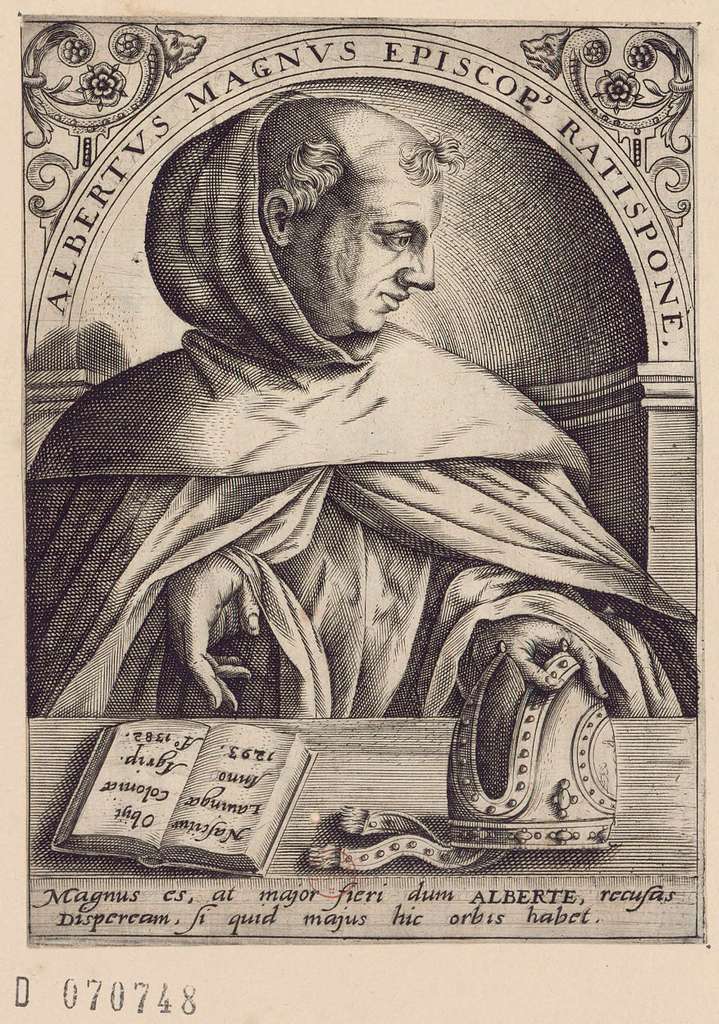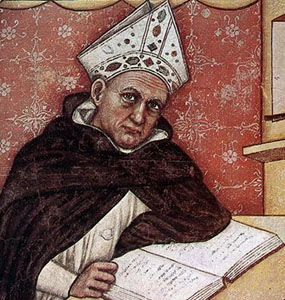
Catholic Saints
Saint Albertus Magnus, born around 1200 in Lauingen, a quaint town in Swabia, Germany, emerged as a towering figure of the 13th century, distinguished as a Dominican friar, bishop, and one of the most revered Doctors of the Church, a title that reflects his extraordinary intellectual prowess, earning him the moniker “Universal Doctor.” Renowned for his encyclopedic knowledge that spanned the vast domains of theology, philosophy, and the natural sciences, he dedicated his life to exploring the intricacies of God’s creation, leaving an indelible mark on medieval scholarship. Albert’s teaching career took him across Europe, from the bustling academic hubs of Paris to the quiet monasteries of Germany, where he lectured with unparalleled depth and mentored luminaries such as Thomas Aquinas, shaping the next generation of thinkers. His death came in 1280 in Cologne, a city where he spent his final years immersed in study and prayer, and his enduring legacy is celebrated annually on his feast day, November 15, a testament to his lasting influence on both Church and science.
His feast day is celebrated on November 15.
Doctor of the Church
Born around 1200 in Lauingen, Albert emerged as one of the most brilliant scholars of the Middle Ages, blending faith with an insatiable curiosity for the natural world.
Albertus Magnus came into the world in the Swabian town of Lauingen, part of the Holy Roman Empire, as a member of the noble Bollstädt family, whose status afforded him access to a robust education uncommon for his time. His intellectual journey began at the University of Padua, a renowned center of learning in northern Italy, where he immersed himself in the liberal arts and first encountered the Dominican Order, which he joined around 1223, drawn by its emphasis on preaching and study. This decision marked a pivotal shift, steering him away from a secular career and toward a life of religious scholarship.
Albert’s thirst for knowledge was boundless, propelling him to explore not only theology and philosophy but also the burgeoning fields of natural sciences, including botany, zoology, and alchemy—disciplines he approached with a rigor that earned him admiration across Europe. His early years as a Dominican were spent teaching and studying in various German monasteries, where his ability to synthesize Christian doctrine with Aristotelian thought began to take shape, laying the foundation for his later reputation as a “Universal Doctor.”
Albert’s academic career took him to the University of Paris around 1245, where he held a prestigious chair in theology and profoundly influenced a generation of scholars, including his most famous student, Thomas Aquinas, whom he mentored with great care. His lectures were a blend of erudition and accessibility, drawing crowds eager to hear his insights on both sacred and secular subjects.
Over the course of his life, Albert produced an astonishing array of writings, including commentaries on Aristotle’s works, theological treatises like Summa Theologiae, and scientific texts such as De Mineralibus, which explored the properties of minerals and metals with a precision that foreshadowed modern scientific methods. These works demonstrated his commitment to understanding the created order as a reflection of divine wisdom, a theme that ran through his extensive corpus of over 40 volumes.
In 1260, Pope Alexander IV appointed him Bishop of Regensburg, a role he accepted reluctantly due to its administrative demands, which clashed with his scholarly pursuits. After serving for just two years, he resigned in 1262, returning to Cologne to resume teaching and writing, a move that underscored his preference for intellectual exploration over ecclesiastical power.
Albert’s contributions to science were groundbreaking for his era, as he meticulously documented observations of the natural world, from the behavior of animals to the composition of stones, earning him posthumous recognition as a precursor to the scientific method. His approach was empirical, insisting on firsthand investigation rather than blind reliance on ancient authorities, a stance that set him apart in medieval scholarship.
Works like De Vegetabilibus showcased his botanical expertise, cataloging plants with an eye toward their practical uses, while his studies in alchemy, though speculative by today’s standards, reflected his desire to uncover the underlying principles of matter—a curiosity that aligned with his theological view of creation as a divine gift to be understood.
Albert passed away on November 15, 1280, in Cologne, surrounded by his Dominican brethren, after a long life dedicated to learning and faith. His death marked the end of an era, but his influence persisted, culminating in his canonization and declaration as a Doctor of the Church in 1931 by Pope Pius XI, a rare double honor that affirmed his sanctity and intellectual contributions.
Celebrated as the patron saint of scientists, Albert’s integration of faith and reason bridged medieval theology with the emerging sciences, influencing figures like Roger Bacon and leaving a lasting imprint on Western thought. His legacy endures in the countless students he inspired and the Church’s continued reverence for his holistic approach to knowledge.
Born in Lauingen.
Born into the noble Bollstädt family.
Began education at University of Padua.
Explored liberal arts.
Joined Dominicans.
Entered religious life in Italy.
Began teaching in Dominican monasteries.
Spread knowledge in German cities.
Taught in Paris.
Mentored Thomas Aquinas.
Appointed Bishop of Regensburg.
Served as bishop briefly.
Wrote De Mineralibus.
Authored key scientific text.
Resumed teaching in Cologne.
Continued scholarly work.
Died in Cologne.
Passed away after a prolific career.

“The whole world is a book written by the finger of God.”
Saint Albertus Magnus Quotes
“Nature must be the foundation and model of science. By observing it closely, we uncover the truths hidden within God’s creation.”
“The aim of natural science is not simply to accept the statements of others, but to investigate the causes that are at work in nature. This pursuit reveals the order and beauty of the world.”
“In the study of nature, we must not be too quick to draw conclusions. Patience allows us to discern the subtle workings of creation with clarity.”
“God has given us reason to know Him through the things He has made. The natural world is a mirror reflecting His infinite wisdom.”
“The greater and more perfect a thing is, the more it reflects the divine. Thus, in studying creation, we ascend to contemplation of the Creator.”
“Wonder is the desire for knowledge. It stirs the soul to seek the truth hidden in all things, both seen and unseen.”